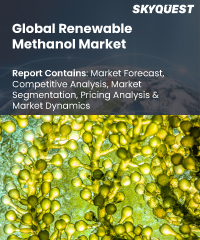
Report ID: SQMIG15C2062

Report ID:
SQMIG15C2062 |
Region:
Global |
Published Date: March, 2024
Pages:
184
|
Tables:
67 |
Figures:
65
Renewable Methanol Market size was valued at USD 212.35 Million in 2023 and is poised to grow from USD 229.13 Million in 2024 to USD 420.96 Million by 2032, growing at a CAGR of 7.9% during the forecast period (2025-2032).
The renewable methanol market has experienced significant growth and attention in recent years as a promising sustainable alternative to traditional methanol production methods. Renewable methanol, also known as bio-methanol or green methanol, is synthesized using carbon dioxide (CO2) captured from industrial processes or directly from the atmosphere, combined with hydrogen derived from renewable sources such as biomass, wind, or solar energy. The market's growth is driven by its potential to address critical environmental and energy challenges. It offers a viable pathway for reducing carbon emissions by utilizing CO2 as a feedstock rather than emitting it into the atmosphere. This aligns with global efforts to combat climate change and transition towards a low-carbon economy.
Renewable methanol finds applications across various sectors. It serves as a clean-burning fuel for transportation, replacing fossil-based fuels and reducing greenhouse gas emissions. Additionally, it is a valuable feedstock in chemical production, enabling the creation of bio-based plastics, solvents, and other products. The versatility of renewable methanol positions it as a key player in the emerging circular economy. Investments and partnerships in research and development have accelerated technological advancements in renewable methanol production, making it increasingly cost-competitive with conventional methods. Government incentives and regulatory support for renewable fuels further bolster market growth.
US Renewable Methanol Market is poised to grow at a sustainable CAGR for the next forecast year.
Our industry expert will work with you to provide you with customized data in a short amount of time.
REQUEST FREE CUSTOMIZATIONWant to customize this report? This report can be personalized according to your needs. Our analysts and industry experts will work directly with you to understand your requirements and provide you with customized data in a short amount of time. We offer $1000 worth of FREE customization at the time of purchase.

Report ID: SQMIG15C2062